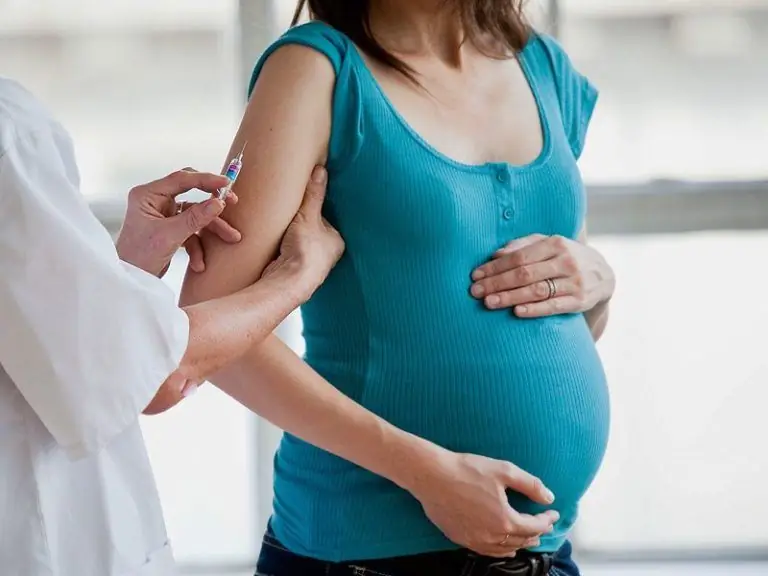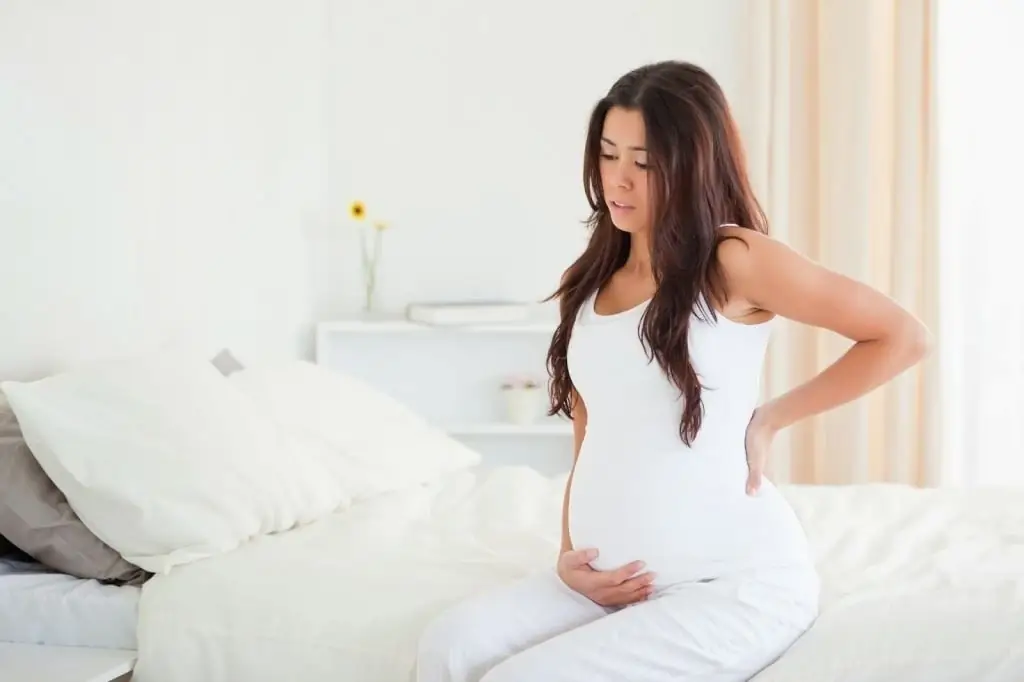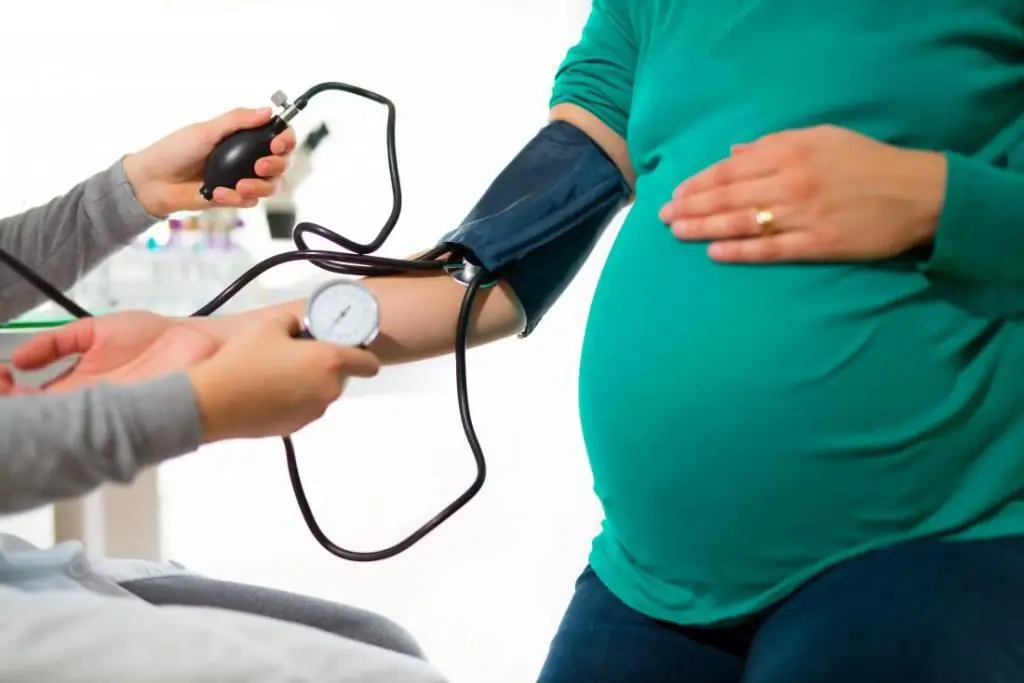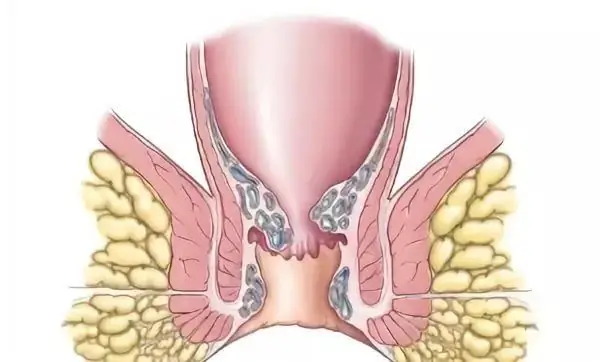2026 Author: Priscilla Miln | miln@babymagazinclub.com. Last modified: 2025-01-22 17:55:22
According to statistics, every third woman consults a doctor with a problem of hemorrhoids during pregnancy. Contrary to popular belief, the disease is not a normal physiological process during childbearing. This is a disease that requires an integrated therapeutic approach, otherwise serious consequences cannot be avoided. Information about how to treat hemorrhoids during pregnancy should be provided by a doctor. Only he can adequately assess the appropriateness of prescribing a particular drug.

Mechanism of development and features of the disease
Hemorrhoids are a widespread vascular pathology that affects both women and men. In many pregnant women, the disease is diagnosed for the first time, since the period of bearing a child serves as a provoking factor for the development of the disease.
In every person, the anal canal is surrounded by cavernous plexuses, through which both veins and arteries pass. These hemorrhoidal formations are necessary in order to regulate the process of blood filling in the anus. This ensures the normal functioning of the rectum: the feces are securely held in it, and the immune barrier between the environment and the body is maintained.
Under the influence of various factors, an inflammatory process may develop or blockage of blood vessels may occur. The natural result is a decrease in their tone. Under the pressure of the blood, the walls of the vessels of the rectum also relax, as a result of which the formation of hemorrhoids occurs. During the process of defecation, the mucous membrane that covers them is injured, resulting in bleeding and pronounced pain.
Depending on the nature of the location of the nodes, hemorrhoids are divided into 2 types:
- Internal. The formations are not visualized during external examination. The nodes are located above the anus and can only be detected by a doctor with a digital examination.
- Outer. With this form of the disease, the formations are localized behind the anus. They are located under a thin layer of skin, but the patient can easily feel the nodes in the anus area on his own. They are uneven in size and painful on palpation.
If hemorrhoids occurred for the first time during pregnancy, it is customary to talk about the acute nature of the pathology. If left untreated, the disease becomes chronic. In such cases, episodes of exacerbation are followed by periods of remission.
There are several stageshemorrhoids, each requiring a specific treatment:
- First. The nodes are located deep above the anal ring.
- Second. When straining during the act of defecation, the formations fall out, but after its completion they are set inside on their own.
- Third. The nodes fall out, but the patient has to set them with his hands.
- Fourth. Surgery is often performed at this stage. This is due to the fact that the nodes are constantly in a dropped state and it is impossible to set them on their own, while there is a threat of pinching formations.
The treatment of hemorrhoids during pregnancy should be started immediately after the onset of the first alarming symptoms. Ignoring the disease can significantly worsen a woman's well-being and negatively affect the he alth of a child.

Reasons
Hemorrhoids in women during pregnancy is a consequence of overflow of blood vessels, which occurs as a result of increased stress on the pelvic organs.
Triggering factors are also the following states:
- constipation due to changes in the digestive process;
- forced immobility, disrupting the outflow of blood from the lower body;
- abuse of s alty or spicy foods;
- overweight;
- long-term use of hormonal contraceptives before pregnancy (such drugs adversely affect the condition of the walls of blood vessels);
- hormonal imbalance;
- raisingitems weighing more than 5 kg.
In addition, hemorrhoids during pregnancy (especially in the 3rd trimester) can occur due to the pressure of the baby's head on the rectum.
Symptoms
The development of the disease is slow. Each stage corresponds to certain signs. In this regard, any woman is able to assess the severity of the existing pathology. But this does not exclude the need to visit a doctor, since during pregnancy hemorrhoids can be confused with other diseases, including cancer.
At the 1st stage, a woman feels:
- mild discomfort during urination;
- pain in the anus during defecation.
Sometimes a small amount of blood can be found in the stool.
2nd stage is characterized by the following symptoms:
- itching in the anus;
- unusual anal discharge;
- periodic loss of knots that reset themselves.
In most cases, women seek medical help in the early stages of the disease. Otherwise, the pathology progresses and passes into external hemorrhoids. During pregnancy, this form of the disease significantly worsens the state of he alth and can affect the intrauterine development of the child.
The last stages are characterized by the following features:
- pronounced pain;
- falling out of nodes that do not self-reset;
- heavy bleeding fromanus;
- increased body temperature (occurs in response to the development of the inflammatory process).
In addition, the nature of the course of hemorrhoids during pregnancy (photo below) can be acute and chronic. In the first case, the pathology appears suddenly, its symptoms are pronounced. In the chronic form of the disease, seizures are quickly stopped by medications, but under the influence of triggering factors they reappear.
Timely treatment of hemorrhoids during pregnancy in a short time not only alleviates the woman's condition, but also reduces the risk of various complications. Thus, it is necessary to consult a doctor when the first symptoms of the disease appear: burning, itching, pain, the presence of blood in the feces and nodules that fall out during straining during defecation.

Diagnosis
To confirm or exclude the alleged diagnosis, you need to make an appointment with a proctologist. The doctor will prescribe a series of studies, the results of which will make it clear at what stage of development the disease is. He will also provide information on how to treat hemorrhoids during pregnancy.
During the reception, the proctologist conducts primary diagnostics, including a survey of the patient and her examination. The presence of hemorrhoids is evidenced by the inflamed mucous membrane of the anus, which has a red tint. In addition, a capillary pattern is visualized on it. During the study, sagging hemorrhoids are also found. Their presence makes it possible to differentiatedisease from oncological pathologies.
To detect nodes located above the anus, the doctor conducts a digital examination. It is carried out as follows: the patient lies on the couch, takes the position recommended by the specialist. Then he puts on medical gloves and treats his index finger with Vaseline. After that, he slowly introduces it into the rectum and assesses the condition of its walls, identifies internal nodes, analyzes their size and location.
Based on the results of the initial diagnosis, the doctor issues a referral for the following laboratory tests:
- Blood test. Needed to confirm anemia, which is a constant companion of hemorrhoids during pregnancy.
- Coprogram. With the help of research, it is possible to detect an inflammatory process developing in the intestine.
- feces for occult blood. In many cases, it is not visible to the naked eye. The analysis is carried out to detect bleeding in the intestines.
It is extremely rare during pregnancy, doctors prescribe sigmoidoscopy. Using this method, it is possible to detect any pathological changes in the rectum at the earliest stage. The essence of the method is as follows: the proctologist lubricates a special tube with petroleum jelly and gently inserts it into the anus by about 5 cm. After a visual inspection using an optical eyepiece, the device is removed, which indicates the completion of the process. If polyps, pus, mucus or blood are found, the doctor removes them during the examination.
Onbased on the results of the diagnosis, the doctor makes the most effective treatment regimen.

Conservative Therapy
When choosing a technique, the specialist takes into account not only the severity of the disease, but also the fact that the prescribed procedures or medications should not adversely affect the course of pregnancy.
The main methods of conservative treatment are:
- stool normalization;
- hygienic procedures;
- use of medicines.
Specialized remedies for hemorrhoids during pregnancy are prescribed only if the disease is at stages 2, 3 or 4. At the very beginning of its development, it is enough for a woman to adjust her diet and regularly carry out hygiene procedures.
To normalize the stool, the following rules must be observed:
- Exclude greasy, fried and spicy foods from the menu.
- Significantly limit the use of flour products.
- Refuse sugary carbonated drinks and coffee. It is recommended to give preference to compotes, green tea and fresh juices.
- The menu should include cereals and vegetable dishes daily.
- Increase consumption of berries and fruits.
- Include dairy products in your diet.
- Maintain water balance. In the absence of contraindications, you must drink at least 1.5 liters of pure non-carbonated liquid.
In order to prevent the attachment of a secondary infection, you need to washanus with warm water using soap after each bowel movement. With the external form of hemorrhoids, this should be done as carefully as possible. After each bowel movement, it is advisable to use wipes designed for intimate hygiene, since ordinary toilet paper is very hard for external knots. Any baths using medicinal herbs are prohibited.
Besides this, you need to take care of the quality of underwear. It should be made of cotton and not squeeze the skin. The right choice of underwear not only provides comfort, but also prevents the further spread of infection.
To eliminate symptoms that significantly impair the quality of life, at the 2nd, 3rd and 4th stages of the disease, the doctor prescribes medications in the form of tablets and external agents. In most cases, medicines in the form of gels, ointments, creams or suppositories are preferred.
As a rule, the doctor prescribes the following drugs:
- Strengthening blood vessels. Against the background of their intake, the outflow of lymph is normalized and the permeability of the walls of veins and capillaries increases. Due to this, the development of the inflammatory process stops.
- Vitamins. Appointed in the complex. The intake of these substances significantly improves the general condition of the body, and, consequently, the well-being of a pregnant woman. Vitamins also help strengthen the walls of blood vessels.
- Microclysters. They are of two types: medicinal and laxative. In the first case, their use eliminates inflammation, in the second - there is a softening of fecalmasses in the intestines and enveloping the mucous membrane, which ensures comfort during defecation.
- Laxatives. Their appointment is advisable only if a pregnant woman regularly has difficulty emptying her bowels. The composition of the drug should be dominated by natural ingredients.
- Rectal suppositories and ointments. Their task is to eliminate pain and relieve inflammation.
Currently, there are many drugs approved for use during pregnancy. However, the adequacy of prescribing a particular drug should be assessed exclusively by the attending physician. This is due to the fact that some medicines contain substances that can lead to miscarriage or premature birth.
Rectal ointments and suppositories are a group of drugs prescribed during the period of bearing a child most often. As a rule, the doctor recommends the use of the following remedies:
- "Hepatrombin". This drug relieves pain, stops bleeding and reduces the severity of the inflammatory process.
- "Heparin ointment". During pregnancy with hemorrhoids, it has an anti-inflammatory effect, relieves pain in a short time. In addition, the tool helps to eliminate blood clots in the vessels. For hemorrhoids during pregnancy, "Heparin ointment" is used both externally and applied to a tampon, which is then inserted into the anus.
- Proctoglivenol. The agent normalizes vascular tone, reduces the permeability of veins and capillaries, stops inflammatoryprocess and relieve pain.
- "Natalsid". The main component of the drug is brown algae, which not only improve the course of the disease, but also soften the stool. Judging by the reviews, hemorrhoids during pregnancy recede in a short time, and the problem of constant constipation is also solved.
- "Relief". Candles accelerate the healing of the mucosa, soften it and eliminate inflammation.
The scheme for using creams and ointments for hemorrhoids during pregnancy should also be made by the attending physician, as he does this taking into account the individual characteristics of the patient's he alth.

Surgery
As a rule, the operation to remove nodes is performed after delivery. In emergency situations (bleeding, pinching), surgical intervention is indicated using methods that are acceptable during pregnancy.
These include:
- Rectoanal lifting. The essence of the method is to pull knots with special threads.
- Hemorrhoidectomy. During the operation, hemorrhoidal formations are removed with a laser scalpel.
- Ligation - pulling nodes that die off and fall off on their own within a few days.
- Photocoagulation. The essence of the method is as follows: using infrared equipment, the nodes are heated, due to which the process of their death starts.
Surgical intervention during pregnancy is treated in rare cases, since hemorrhoids are not a contraindication to natural childbirth.
Folk treatments
To eliminate unpleasant symptoms, it is allowed to use non-traditional methods. It is important to understand that alternative methods of treating hemorrhoids during pregnancy at home must be previously agreed with the doctor.
Most Effective Recipes:
- Appliques with sea buckthorn oil. Their use reduces the severity of the inflammatory process and promotes healing of the mucosa.
- Finely grate the beets and carrots, mix them in a 1:1 ratio and wrap in gauze. Apply a compress for at least 1 hour.
- Prepare a decoction of the bark or viburnum berries. Regular use of it helps to get rid of pain and stops bleeding. At the same time, it is undesirable to use fresh berries during pregnancy.
- Grind rowan berries and apply to the affected area in the form of a compress. The resulting slurry stops bleeding and fights germs.
If an allergic reaction occurs, self-medication with folk methods should be stopped.

Consequences
Hemorrhoids is a disease, the treatment of which cannot be delayed until the postpartum period. This is due to the fact that a pregnant woman is gradually feeling worse, which cannot but affect the intrauterine development of the child. In addition, ignoring the problem significantly increases the risk of a secondary infection joining the existing inflammatory process, which is dangerous for the baby.
Anemia is also one of the seriousconsequences of hemorrhoids during pregnancy. What to do to avoid this? At the first signs of pathology, it is necessary to contact a proctologist. Timely medical care will help to avoid infections, anemia and accompanying hypoxia.
Prevention
Based on numerous reviews, hemorrhoids during pregnancy are not a sentence. It is quite easy to treat, but doctors recommend certain preventive measures, as the disease negatively affects the well-being of a pregnant woman.
In order to prevent the development of pathology, you need:
- Constantly maintain normal bowel function. Adjusting the diet in accordance with the principles of he althy eating helps to get rid of constipation.
- Monitor body weight.
- Do not lift heavy objects.
- Do simple gymnastic exercises every day. This is necessary to get rid of congestion in the pelvic organs.
- Stop taking long walks.
Compliance with these recommendations significantly reduces the risk of disease.

In closing
Hemorrhoids during pregnancy are not uncommon, but contrary to popular belief, they need to be treated. Otherwise, serious complications cannot be avoided. When the first warning signs appear, you should contact a proctologist, who will draw up the most appropriate treatment regimen.
Recommended:
Rubella during pregnancy: consequences for the fetus, symptoms and treatment

What is the common childhood rubella disease during pregnancy? How can this disease be recognized? What threatens rubella transferred during pregnancy? Consequences for mother and child. How to exclude the possibility of rubella during pregnancy? Do I need to be vaccinated against it? Are there complications in children after childbirth if the mother has had rubella during pregnancy?
Hypertension during pregnancy: causes, symptoms, prescribed treatment, possible risks and consequences

Many women have heard of hypertension during pregnancy. In particular, those mothers who carried more than one child under their hearts know exactly what they are talking about. But at the same time, not everyone knows about the serious consequences, if you ignore the first alarming "bells" of this problem. But this phenomenon is not so rare among pregnant women. And so it can be considered a problem
Hypotension during pregnancy: possible causes, symptoms, treatment, normal pressure during pregnancy, advice and recommendations from a gynecologist

What is hypotension during pregnancy? Is it a simple ailment, or a severe pathology that requires immediate medical attention? That is what we will talk about today. During the period of bearing a baby, every woman is faced with various ailments, because the body works "in three shifts", and gets tired in order. At this time, chronic diseases are exacerbated, and "sleeping" ailments are awakened, which could not be suspected before pregnancy
Treatment of external hemorrhoids during pregnancy: a list of drugs, instructions for use

Expectant mothers unwittingly face an intimate problem - external hemorrhoids. The condition is extremely common. Almost half of pregnant women seek medical attention with symptoms of external hemorrhoids. Since the woman is in position, the treatment is of a special nature
Effective treatment of hemorrhoids during pregnancy

Hemorrhoids are varicose veins in the rectum. It can appear both at the very beginning of pregnancy, and during gestation or after childbirth. It is widely believed that it is labor activity that provokes the development of hemorrhoids, but this is a myth, since even a caesarean section often causes an exacerbation. But still there is a direct connection between the disease and pregnancy, since the bearing of a child is one of the provoking factors

